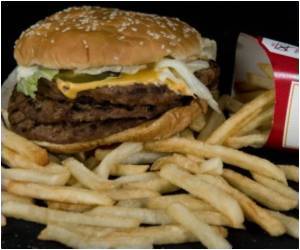A fat-laden diet can quicken the onset of pancreatic cancer in humans, reveals a new study.
Earlier studies on human have proved that a link exists between high fat diet, obesity and an increased risk of developing pancreatic cancer, but the mechanism that leads to this development was not properly understood.Guido Eibl, who works as an associate professor of surgery at UCLA’s David Geffen School and his colleagues carried out experiments to test the hypothesis that diet has a link to cancer.
They selected mice with a mutation in the KRAS (a gene that predisposes them to develop pancreatic pre-cancer) and fed one group with low fat diet and another group with high calorie and high fat corn oil based food.
It was observed that 90 percent of the mice that were fed with the special high fat diet became obese, developed insulin resistance, inflammations and precancerous lesions in the pancreatic cells, in comparison to the mutated mice fed on normal diet. All these were prerequisites for the development of cancer.
"Our results showed that in mice, a diet high in fat and calories led to obesity and metabolic disturbances such as insulin resistance thatare seen in obese humans", states Guido Eibl..
Eibl also says, "the high-fat, high-calorie diet accelerated pancreatic cancer development. A KRAS mutation in the pancreas might not be sufficient to cause an individual to develop pancreatic cancer. It likely needs something in addition – a secondary hit. Our study showed that a high-fat, high-calorie diet could provide an environmental secondary hit and trigger cancer development."
The results of this study were presented at the American Association for Cancer Research`s conference `Pancreatic Cancer: Progress and Challenges` organized on June 18-21.
Pancreas is an organ that is situated behind the stomach at the back of the abdomen. It contains both the exocrine and the endocrine glands. The endocrine cells are found in clusters and are known as the islet of Langerhans. These cells release insulin and play a very important role in controlling blood sugar levels. When the islets of langerhans do not function properly, it results in diabetes.
Cancer of the pancreas occurs when the pancreatic cells divide uncontrollably and give rise to tumors. Tumors that affect the exocrine glands in the pancreas are the most common and are known as adenocarcinomas.
There are several factors that increase one’s risk for pancreatic cancer. They include a person’s family history, lifestyle trends and habits.
References:
1. Zeenews.india.com
2. www.medicaldaily.com
3. http://www.medicalnewstoday.com/info/pancreatic-cancer/
Source-Medindia















